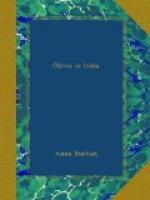I don’t suppose you know anything about mission work? Neither do I, which is very shocking, as I have had every opportunity of acquiring information. Perhaps, as a child, I was taken to too many missionary meetings, with their atmosphere of hot tea and sentiment, and heard too much of “my dear brothers and sisters in the mission field,” for I grieve to say, before I came to India, I quite actively disliked missionaries and thought them a feeble folk. Mother was the only kind of missionary I liked. She has a mission—so we tell her—to the dreary people of this world. Not the very poor—they are vastly entertaining—but the not-very-rich, highly respectable, deadly dull people, with awkward, unlovable manners, whom no one cares very much to visit or to ask to things, and who must often feel very lonely and neglected. While others are taken up with more entertaining company Mother has time to trot to these people with a new book or magazine, or merely to talk for half an hour in the funny bright way which is like no one else’s way; has them to the house to meet interesting people (in spite of the remonstrant groans of the family), and having brought them does not neglect them, but draws them out till they seem quite brilliant, and they go away warmed and enlivened by their social success.
Even the most determined distruster of missions couldn’t stay long at Takai without being converted. Dr. Russel, very far from being feeble, is a most able man, who would have made his mark in his profession at home; but he prefers healing the bodies and saving the souls of the Santals in the jungle, to building up a lucrative practice, and even attaining the dizzy height of a knighthood.
To heal their poor neglected bodies; to be the first to tell them of Jesus—how did Festus put it?—“one Jesus, which is dead, whom Paul affirmed to be alive”; to teach them, to help and raise them until life becomes for these natives a new and undreamed-of thing—one can see how fine it is, how soul-satisfying!




